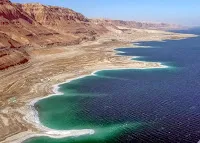Jordan said Monday it had chosen five international consortiums to build the first phase of a multi-million-dollar canal linking the Red Sea to the shrinking Dead Sea.
The ambitious $1.1 billion project has been in the works for more than a decade and aims to provide much-needed water to Jordan, Israel and the Palestinian territories.
It moved closer to reality in December 2013 when Israel, Jordan and the Palestinian Authority signed a water-sharing deal.
Jordan's water and irrigation ministry in a statement Monday said the consortiums were made up of 20 engineering firms from Asia, Europe and North America.
The first phase of the project involves building a conveyance system to transfer 300 million cubic meters (10.6 billion cubic feet) of water each year from the Red Sea to the Dead Sea.
The ministry has said it would also see the construction of a desalination plant with a capacity of 65-85 million cubic meters a year.
Experts have warned that the Dead Sea, the lowest and saltiest body of water in the world, is on course to dry out by 2050.
Its degradation started in the 1960s when Israel, Jordan and Syria began to divert water from the Jordan River, the main source for the Dead Sea.
Water is a rare resource in Jordan, where 92 percent of the land is desert. The country is home to around seven million people and the population is growing with an influx of refugees from Syria.
Several environmental groups have warned that the project could undermine the fragile ecosystem of the Dead Sea, which they fear could be contaminated by water from the Red Sea.
[elethos.gr/AFP]
28/11/16
-
Related:
The ambitious $1.1 billion project has been in the works for more than a decade and aims to provide much-needed water to Jordan, Israel and the Palestinian territories.
It moved closer to reality in December 2013 when Israel, Jordan and the Palestinian Authority signed a water-sharing deal.
Jordan's water and irrigation ministry in a statement Monday said the consortiums were made up of 20 engineering firms from Asia, Europe and North America.
The first phase of the project involves building a conveyance system to transfer 300 million cubic meters (10.6 billion cubic feet) of water each year from the Red Sea to the Dead Sea.
The ministry has said it would also see the construction of a desalination plant with a capacity of 65-85 million cubic meters a year.
Experts have warned that the Dead Sea, the lowest and saltiest body of water in the world, is on course to dry out by 2050.
Its degradation started in the 1960s when Israel, Jordan and Syria began to divert water from the Jordan River, the main source for the Dead Sea.
Water is a rare resource in Jordan, where 92 percent of the land is desert. The country is home to around seven million people and the population is growing with an influx of refugees from Syria.
Several environmental groups have warned that the project could undermine the fragile ecosystem of the Dead Sea, which they fear could be contaminated by water from the Red Sea.
[elethos.gr/AFP]
28/11/16
-
Related:
- Israel's Dead Sea will dry out by 2050: experts
- Israel, Palestine, Jordan unite to save revered river (video Al Jazeera)


No comments:
Post a Comment
Only News